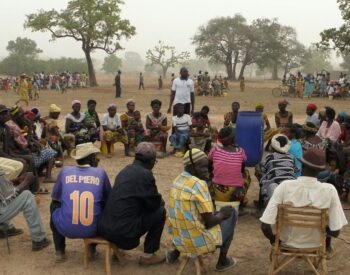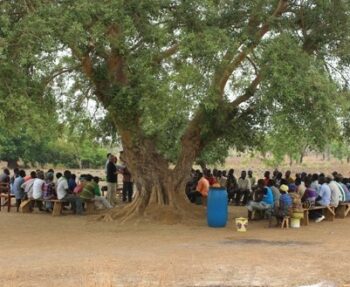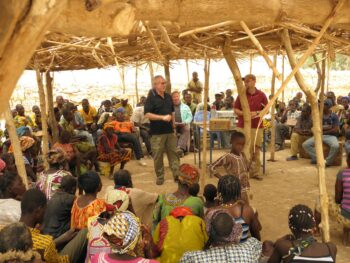
By Jerry Wiles —
In a recent effort to activate individuals to more intentionally reach out and share the Gospel, a group in a local congregation launched a prayer walking initiative. Actually, it’s more than praying, and more that walking. The idea of cultivating a Prayer-Care-Share Lifestyle of organic outreach, is orienting and equipping followers of Jesus to be alert to the opportunities we have every day, wherever we happen to be, to connect with people, have conversations, establish rapport – that can lead to Jesus conversations.

Better Caught, Than Taught
When believers are properly trained with a few basic skills, especially those taught in Bible Storying or Orality Training, they can simply make eye contact, smile, greet people, and watch how the Holy Spirit often opens up opportunities to engage in gospel conversations. When it comes to sharing or communicating the love and message of Jesus, and making disciples, it’s better caught than taught. Observation, engagement, and participation is more effective in most cases than lectures, books, instructional manuals or sermons.

Normal Traffic Patterns
Those natural, spontaneous opportunities can happen regularly in our normal traffic patterns. We all live in a mission field, made up of our families, neighbors, co-workers or fellow students, and friends, as well as other connections we might have anywhere we encounter people.
Disciple Making and Church Planting Movements are increasingly topics of discussion among global mission leaders. Following are some important questions to consider:
- What does it take, and who is qualified to plant a church?
- What would a biblically based, culturally-relevant church look like in your community?
- What are the most important ingredients to begin a reproducing, multiplying church planting/disciple making movement?

Planting Seeds
I suggest that (based on Scripture, rather than modern church traditions) every follower of Jesus can and should be a disciple maker. Furthermore, properly understanding what a church exists for, that every follower of Jesus can be instrumental in simple, organic churches (groups of Jesus followers) being planted. In reality, we are not commanded to plant churches, but to plant the Seed of the Word of God, the Gospel. We are to communicate the Good News of Jesus to everyone and to make disciples of all people. I’d like to suggest that there are some simple, practical steps to get us on the journey of doing just that.
The 21st Century Church
Consider how the Gospel spread throughout the entire populated world in the First Century, before the invention of radio, television, the internet, or the printing press. Think about how God preserved the accuracy of His message (His Word) in predominantly Oral Cultures, before it became a written text. The more we understand about the Early Church, the better we can understand about what it will take to communicate the Good News of Jesus and make disciples among the least and last unreached people of the world. My friend Dr. Thom Wolf, a respected global missiologist, has said that the 21st Century Church may look a lot like the 1st Century Church.

Asking the Right Questions
Think about how Jesus communicated His message and trained His disciples? How the disciples reproduced His message that has now resulted in more than 2 billion on the planet who identify with the Christian faith? (Recognizing, of course, that many identify themselves as Christians, but still are not true followers of Jesus). I had a conversation with the leader of a large mission organization on these questions and related topics. One of his comments was, “I haven’t thought about that, no one has ever asked me those questions.” My immediate thought was, perhaps we should be asking those questions and having those conversations if we are going to be successful in completing the Great Commission.
Lessons from the Global South and the Early Church
Some important questions to consider, for those who are serious about obeying all the commands of Jesus, are “How do most people best receive, understand, respond to and reproduce the message and love of Christ?” These are issues that help us realize that the concepts, principles and practices of Orality are vital to advancing the Kingdom of God and completing the Great Commission. The majority of the people of the world, even today are Oral Learners, by necessity or by preference, and will not be reached by modern, Western (especially text-based) styles of communication. Actually, the lessons we can learn from the rapidly reproducing disciple making and church planting movements (mostly in the Global South) and from the Early Church, are more relevant to spreading the Gospel today than much of the Post-Reformation and Modern Western methods.

Biblical, Understandable and Reproducible
From our learning journey with Living Water International, the International Orality Network, and other mission organizations, it’s encouraging to see people come alive with new excitement and vision for mission and ministry impact. Communicating the Good News of Jesus and making disciples are not as complicated as they have become in many Church traditions in North America and the Western World. Proper Orality Training can equip ordinary followers of Jesus with skills that are biblical, understandable and reproducible to all places and every people group on earth.
Multiplying Impact
Reproducibility is vital to fostering multiplication movements. A pastor in an African country participated in one of Living Water International’s Orality Training for Trainers (OT4T) events. The very next week back in his home community, he trained more than 30 other pastors in the Orality methods he had just learned. A few months later we received reports of how the churches in that region were experiencing more growth and reproducing church planting efforts, as a result of implementing the Orality Training.
Integral Mission and Community Development
Churches in Central America, Africa and Asia are discovering how Orality Strategies are enhancing their integral mission and community development efforts. USA-based ministries and churches are effectively using concepts and principles of Orality in sharing the Gospel and making disciples in prisons, nursing homes, among street gangs, and with refugee and immigrant communities, international students, and mission trips, to name a few. As the Orality Movement continues to grow, and there are increasing opportunities for cross-pollination, we are gaining a richer and fuller understanding of the multiple aspects and applications.

Power of Small, Simple and Reproducible
Foundational, of course, to the effectiveness within the Orality Movement is prayer and the work of the Holy Spirit. The same Holy Spirit that was at work more than 2,000 years ago in the Early Church is still at work today. Imagine how just a few changes of methods and strategies can greatly accelerate the growth of the Jesus Movement. Mass meetings, big events and the use of radio, television and modern technology all have their place in today’s church/mission enterprises. However, the importance of small, simple, reproducible systems and structures cannot be overlooked or over emphasized. Jesus Himself focused on influencing the few, in order to impact the many.
Power of the Spoken Word
One of the valuable lessons we learn from the story of Jesus Calming the Storm, recorded in Mark chapter 4, is the power of the Spoken Word. Jesus rebuked the wind and spoke to the waves, and there was a perfect calm. We often ask, “Does His Word still have power today? Do our words have power. Actually, His Word has power in all forms and expressions. When followers of Jesus grasp the power of speaking His Word, they often have more confidence and boldness to share with others.
Great Stories to Tell
In our Bible Storying and Orality Training Workshops, we emphasize that we don’t have to be great storytellers, because we have great stories to tell. When we tell the true stories from the Word of God, we can trust and expect the Holy Spirit to touch hearts and transform lives. Every believer can tell their own story or testimony and share God’s story in a natural and conversational manner. Asking questions, listening, and finding common ground for conversations are all simple and effective methods that anyone can use and can lead to life changing experiences.
For more information, visit: www.water.cc/orality-training



